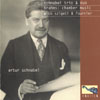Schnabel plays Brahms
Musical manna from Heaven that sounds as if it’s travelled the distance. No matter, the performances are truly priceless
View record and artist detailsRecord and Artist Details
Composer or Director: Johannes Brahms
Label: Arbiter
Magazine Review Date: /2000
Media Format: CD or Download
Media Runtime: 78
Mastering:
ADD
Catalogue Number: ARBITER121

Tracks:
| Composition | Artist Credit |
|---|---|
| Piano Trio No. 1 |
Johannes Brahms, Composer
Artur Schnabel, Piano Johannes Brahms, Composer Joseph Szigeti, Violin Pierre Fournier, Cello |
| Sonata for Violin and Piano No. 1 |
Johannes Brahms, Composer
Artur Schnabel, Piano Johannes Brahms, Composer Joseph Szigeti, Violin |
| Sonata for Violin and Piano No. 2 |
Johannes Brahms, Composer
Artur Schnabel, Piano Johannes Brahms, Composer Joseph Szigeti, Violin |
Author: Rob Cowan
Every now and then one reads of a vintage ‘dream combination’ that posits the distant possibility of an undiscovered recording. The trio of Artur Schnabel, Bronislaw Huberman and Pablo Casals is one, and of Schnabel, Joseph Szigeti and Pierre Fournier, another. No luck so far with the first, but here, quite out of the blue, is the second, a slice of history that, although scuffed, clouded and awkward on the ear, reveals so many wonderful things that on hearing it for the first time my eyes quite literally filled with tears.
Recent conversations with Jean Fonda-Fournier (Pierre’s son) had me longing for legendary but apparently unrecorded chamber music partnerships between Fournier and Solomon, or Zino Francescatti, or Arthur Grumiaux, or William Primrose. The present line-up is even more mouth-watering and the resultant CD, although sonically compromised in part, fully reaches my expectations.
Schnabel articulates the Trio like no one else on disc, quietening his tone among the Scherzo’s myriad mysteries and holding the tension in the Adagio (which is broader than Fournier’s RCA recording with Rubinstein by some two minutes). Listen to how, at the opening of the Scherzo (after Fournier’s initial gesture), Schnabel builds the phrase, accentuates the bass then lets it dart into oblivion. He has a way of seeing a passage through, reaching across whole stretches of music so we can gauge their meaning and profile, a bit like assessing the grand plan of a great painting from a sensible distance.
True, there are fluffs and ‘gulped’ phrases, but Schnabel’s intuition remains an inspiration. Fournier is a ‘grounding’ presence, sympathetic, solid and sensually alluring. Szigeti is equally capable of drawing long lines, though he employs a wider vibrato than Fournier and a thinner stream of tone. But they fit well together and sound as if they’re on ‘good speaking terms’.
Don’t be put off by the Trio’s opening 23 seconds. Sonically, they’re among the worst, but things improve drastically thereafter. The two violin sonatas with Szigeti and Schnabel are more troublesome, sound-wise, the Second especially. But again the sense of equipoise and freewheeling spontaneity has one mentally sweeping surface noise aside for the sake of what is being heard. I shan’t underplay the technical faults: there are missing notes, frequent bouts of distortion and patches of very bad surface. But nothing essential is obscured and if you’ve got the patience and the will to let your mind overrule your senses, then this CD provides a Brahms experience without parallel. I strongly recommend that you give it a try.'
Recent conversations with Jean Fonda-Fournier (Pierre’s son) had me longing for legendary but apparently unrecorded chamber music partnerships between Fournier and Solomon, or Zino Francescatti, or Arthur Grumiaux, or William Primrose. The present line-up is even more mouth-watering and the resultant CD, although sonically compromised in part, fully reaches my expectations.
Schnabel articulates the Trio like no one else on disc, quietening his tone among the Scherzo’s myriad mysteries and holding the tension in the Adagio (which is broader than Fournier’s RCA recording with Rubinstein by some two minutes). Listen to how, at the opening of the Scherzo (after Fournier’s initial gesture), Schnabel builds the phrase, accentuates the bass then lets it dart into oblivion. He has a way of seeing a passage through, reaching across whole stretches of music so we can gauge their meaning and profile, a bit like assessing the grand plan of a great painting from a sensible distance.
True, there are fluffs and ‘gulped’ phrases, but Schnabel’s intuition remains an inspiration. Fournier is a ‘grounding’ presence, sympathetic, solid and sensually alluring. Szigeti is equally capable of drawing long lines, though he employs a wider vibrato than Fournier and a thinner stream of tone. But they fit well together and sound as if they’re on ‘good speaking terms’.
Don’t be put off by the Trio’s opening 23 seconds. Sonically, they’re among the worst, but things improve drastically thereafter. The two violin sonatas with Szigeti and Schnabel are more troublesome, sound-wise, the Second especially. But again the sense of equipoise and freewheeling spontaneity has one mentally sweeping surface noise aside for the sake of what is being heard. I shan’t underplay the technical faults: there are missing notes, frequent bouts of distortion and patches of very bad surface. But nothing essential is obscured and if you’ve got the patience and the will to let your mind overrule your senses, then this CD provides a Brahms experience without parallel. I strongly recommend that you give it a try.'
Discover the world's largest classical music catalogue with Presto Music.

Gramophone Digital Club
- Digital Edition
- Digital Archive
- Reviews Database
- Full website access
From £8.75 / month
Subscribe
Gramophone Full Club
- Print Edition
- Digital Edition
- Digital Archive
- Reviews Database
- Full website access
From £11.00 / month
Subscribe
If you are a library, university or other organisation that would be interested in an institutional subscription to Gramophone please click here for further information.




